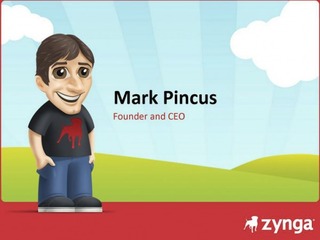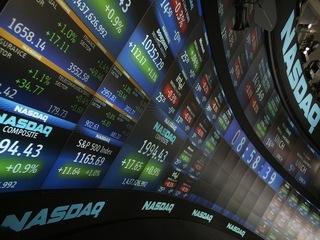Rising infertility concerns fuel growth of male-focused innovative startups
Fertility treatments are more relevant than ever; here are a few startups pioneering new solutions
Read more...
Yikes. There's some unhappy Zynga shareholders this afternoon, as Zynga's stock broke through its IPO price of $10 a share and closed there. Zynga ended its debut day at $9.50, down 50 cents.
The poor showing came after the stock popped opened at $11, when Zynga opened its first day of trading on the NASDAQ under the ticker: ZNGA.
What this means is that Zynga bankers didn't leave any money on the table. Typically, if a stock soars on the first day of trading, it can often suggest that the bankers priced the stock at a discount to its real value so new public shareholders could get some upside. Even though bankers priced the stock reasonably well, it's not a good sign when a stock falls below its IPO price, on the first day no less.
It probably shouldn't come as a surprise. A 10% pop is a modest one compared to past Internet IPOs in recent history. Groupon opened on the exchange a substantial 30% above its initial price and LinkedIn opened and almost double the $45 stock price on its first day. Even the now troubled Pandora saw a 31% pop for its stock upon it debut. This may mean that investors are hedging their bets after being burned by past tech IPOs or it could mean that people are hestitant over Zynga's business model, but either way it spells some concern for the social gaming company if the stock doesn't see an overall jump for its first day of trading.
With 100 million shares sold today, the multibillion-dollar social gaming company was $11 out of the gate despite divided industry insight on how the San Francisco company would do publicly.
Zynga's CEO Mark Pincus virtually rang in the opening bell from Zynga’s San Francisco headquarters this morning.
Pincus along with his wife Alison, co-founder of One King's Lane, and board member Bing Gordon watched their stock enter the public market as members of the gaming company revved up the mood for Friday's day of trading.
In the first (of many) SEC S-1 filings, the company planned to raise $1 billion and, since the initial July 1 filing, Zynga valuation has yo-yoed between $7 billion and $20 billion.
The stock pricing set for the company puts its the market cap at $8.9 billion. Analysts have estimated that Zynga's revenue next year at $1.5 billion and that puts the price-to-revenue mutliple at about 5.85.
The 100 million shares offered at $10 a piece was the top end of the initally filed $8.50 to $10 range set by Zynga -- but regulations would have allowed the company to sell as high as $12 a share and pump up the number of shares to 115 million. This means that even at the high end of the set range, Zynga and its financial team are still using caution in the pricing of this IPO so that it doesn't become the next Groupon where the stock suffers in coming weeks because it was over-valued.
Pincus spent the last two weeks pitching his rapidly growing company to investors that had concerns about whether the company could improve upon its financial viability.
In order to gain confide nce, Pincus has had to explain the multi-pronged business strategy that Zynga has and down play the dependance it has on Facebook.
nce, Pincus has had to explain the multi-pronged business strategy that Zynga has and down play the dependance it has on Facebook.
Since more than 90% of Zynga's revenue comes from Facebook, this was no easy feat, but it appears that investors were clamoring to get their hands on the gaming stock.
Last week, Pincus did claim that the company is in the works to double the number of paying players in its community -- but he conveniently failed to mention the timeline that this would happen in.
Zynga's public debut was the most anticipated final IPO in a week of 11 stock inaugurations.
This ZYnga IPO is the biggest by a U.S. Internet company since Google Inc. (GOOG) raised $1.9 billion in its 2004 IPO and has kept a lot of investors looking to Asian public companies to see what could happen when a social game enters the market.
 Many were concerned that Zynga's entrance to the Nasdaq would mirror Groupon's debut since they both have shown slowing growth and a failure to capture more people willing to spend money on their services.
Many were concerned that Zynga's entrance to the Nasdaq would mirror Groupon's debut since they both have shown slowing growth and a failure to capture more people willing to spend money on their services.
Zynga has seen growth in its annual revenue from $19.4 million in 2008 to $597.5 million in 2010. Even the first nine months of 2011, the company saw the continued growth, but at a slowing pace, when the company generated revenue of $828.9 million.
With Facebook pocketing 30% of the virtual credits purchased on its platform and amending its gaming system to cost developers an arm and a leg to perform on the site, Zynga has been fighting to prove that it has legs and can bring its users to the other screens that players work on.
 Zynga’s games have somewhere in the range of 54 million daily active users and 227 million monthly active users in 175 countries -- but, again, mostly via Facebook.
Zynga’s games have somewhere in the range of 54 million daily active users and 227 million monthly active users in 175 countries -- but, again, mostly via Facebook.
In order to squash some of the concerns that it couldn't stand on its own, Zynga spent most of the summer and Fall announcing new games, offering games on other sites and setting up its own gaming platform.
But some industry analysts have looked at the individual revenue generating power of Zynga and have stated their opinion that Zynga will underperform from what the company is selling its investors.
Arvind Bhatia, an analyst with Brett Strauser, told me that Zynga will grown but at a much slower pace than many would like to see at this stage in the company's life.
"Zynga is not taking off like people are hoping it will," Bhatia told VatorNews. "It is releasing games slower and, after their initial pops, they are fizzling below any expectations."
Bhatia pointed to the promise that came from the CityVIlle launch last year, when the game doubled the FarmVille traffic, and now seeing half the traffic of the company's lead game. Other warning signs that Bhatia says investors will be looking at include the lackluster showing that Zynga's Asian rival, Nexon, saw when it went public this year on the Tokyo Stock Exchange -- where the stock broke through the deal price and closed down 2.3%.
"People see that the same week as Zynga's IPO and will draw their comparisons," Bhatia said.
But, despite the challenges facing Zynga, the company has placed a lot of hope on its new platform called "Project Z." This endeavor would, hopefully, boost revenue by cutting Facebook out of their digital goods pie so that the company could collect all of the revenue -- but with the disadvantage of not having a captive audience of more than 800 million people.
"Despite the challenges of modeling Zynga, we believe the investment opportunity afforded by the IPO range is compelling," Richard Greenfield with the US brokerage BTIG tad VatorNews. "Beyond the aforementioned attractive growth dynamics of social media and IP-connected devices that enable access to Zynga’s social games, Zynga’s sheer size and scale is a major reason behind our favorable view of the IPO."
Social and mobile gaming is a significant $8 billion industry that is growing at a rapid pace. Investors were clearly drawn by the ability to create and sell digital goods at an unparalleled rate -- not to mention the attractive nature that marketers see in the housewife demographic of its users.
Image Sources -- Siliconangle.com and Mashable.com
Fertility treatments are more relevant than ever; here are a few startups pioneering new solutions
Read more...After a trial in select locations, Elon Musk is expanding its fee to more X users
Read more...The tools include content such as educational videos, recipes, and daily nutrition tips
Read more...Startup/Business
Joined Vator on
Zynga is the largest social gaming company with 8.5 million daily users and 45 million monthly users. Zynga’s games are available on Facebook, MySpace, Bebo, Hi5, Friendster, Yahoo! and the iPhone, and include Texas Hold’Em Poker, Mafia Wars, YoVille, Vampires, Street Racing, Scramble and Word Twist. The company is funded by Kleiner Perkins Caufield & Byers, IVP, Union Square Ventures, Foundry Group, Avalon Ventures, Pilot Group, Reid Hoffman and Peter Thiel. Zynga is headquartered at the Chip Factory in San Francisco. For more information, please visit www.zynga.com.

Joined Vator on



